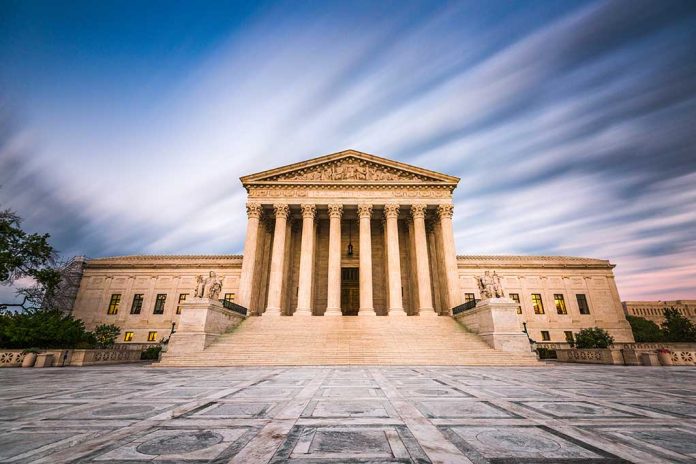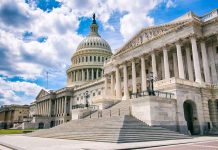
The Supreme Court declines to hear appeal on Boston’s controversial school admissions policy, leaving parents outraged and conservatives dismayed.
At a Glance
- Supreme Court rejects appeal from Boston parents over alleged racial bias in elite high school admissions
- Temporary policy prioritized ZIP codes and grades over entrance exams, reportedly disadvantaging White and Asian students
- Justices Alito and Thomas dissented, arguing the policy perpetuates race-based affirmative action
- Case dismissed as moot due to policy changes, but concerns over racial preferences in admissions persist
Supreme Court Declines to Intervene in Boston School Admissions Controversy
In a move that has left many conservative parents and advocates frustrated, the Supreme Court has declined to hear an appeal challenging a controversial admissions policy for Boston’s elite high schools. The policy, implemented during the COVID-19 pandemic, replaced traditional entrance exams with a system based on grades and ZIP codes, leading to accusations of racial bias against White and Asian students.
The Boston Parent Coalition for Academic Excellence brought the case forward, arguing that the policy violated the Supreme Court’s recent decision on affirmative action in college admissions. However, the high court’s refusal to take up the case leaves lower court rulings in place, which found the admissions criteria to be racially neutral.
Supreme Court rejects Boston parents' appeal claiming racial bias in an admissions policy https://t.co/QbZBoUqUEu
— Fox News (@FoxNews) December 10, 2024
Conservative Justices Express Concern
While the majority of the court declined to hear the case, Justices Samuel Alito and Clarence Thomas dissented from the decision. In a scathing rebuke, they characterized the lower court’s ruling as a “glaring constitutional error that threatens to perpetuate race-based affirmative action in defiance of” recent Supreme Court precedent.
“a glaring constitutional error that threatens to perpetuate race-based affirmative action in defiance of” – Alito
Justice Neil Gorsuch, while not joining the dissent, also expressed concerns about the policy. However, he noted that the court did not need to hear the case since the policy had been revised, stating, “The parents and students do not challenge Boston’s new policy, nor do they suggest that the city is simply biding its time, intent on reviving the old policy.”
Supreme Court rejects appeal from Boston parents over race bias in elite high school admissions https://t.co/bm5o7ylF1a
— Daily Press (@Daily_Press) December 9, 2024
Impact on Elite Boston Schools
The case centered on three prestigious Boston schools: Boston Latin School, Boston Latin Academy, and the John D. O’Bryant School of Mathematics and Science. In 2020, these institutions suspended entrance exams due to pandemic concerns, opting instead for a system based on GPA and ZIP codes. This change resulted in a significant shift in the demographic makeup of admitted students, with fewer White and Asian students gaining entrance.
Critics argue that this policy change was a thinly veiled attempt to manipulate racial demographics under the guise of pandemic safety measures. The resulting shift in student body composition has left many parents feeling that their children were unfairly disadvantaged based on their race or ethnicity.
Supreme Court rejects appeal from Boston parents over race bias in elite high school admissions | Click on the image to read the full story https://t.co/0tz7pdtTyh
— WCVB-TV Boston (@WCVB) December 9, 2024
Implications for Future Admissions Policies
While the Supreme Court’s decision not to hear the case may seem like a setback for opponents of race-based admissions policies, the issue remains far from settled. The court’s recent ruling against affirmative action in college admissions has set a clear precedent against the use of race as a factor in educational admissions.
“The parents and students do not challenge Boston’s new policy, nor do they suggest that the city is simply biding its time, intent on reviving the old policy. Strictly speaking, those developments may not moot this case. But, to my mind, they greatly diminish the need for our review.” – Justice Neil Gorsuch
As schools and universities grapple with how to maintain diversity without explicitly considering race, we can expect to see more creative—and potentially controversial—approaches to admissions. The Boston case serves as a stark reminder that the battle over equal opportunity in education is far from over, and conservative parents and advocates must remain vigilant against attempts to circumvent the spirit of the law through cleverly disguised policies.
Sources:
- Supreme Court rejects appeal from Boston parents over race bias in elite high school admissions
- Supreme Court rejects Boston parents’ appeal claiming racial bias in an admissions policy
- Supreme Court rejects appeal from Boston parents over race bias in elite high school admissions
- Supreme Court rejects appeal from Boston parents over race bias in elite high school admissions

















